Research Project: Eco-Friendly Initiatives and Holiday Decisions
VerifiedAdded on 2022/12/27
|8
|1911
|35
Project
AI Summary
This research project investigates the influence of eco-friendly initiatives, strategies, and policies on consumer decision-making when selecting holiday destinations, focusing on the Scottish Highlands as a case study. The introduction highlights the growth of the tourism and hotel industry and the increasing importance of sustainability. The research aims to determine the role of eco-friendly practices in customer choices, with objectives including understanding the need for sustainability, examining the impact of eco-friendly strategies, and providing recommendations for hospitality organizations. The literature review covers the need for sustainability in the hospitality industry, the role of eco-friendly strategies, and recommendations for hospitality organizations. A questionnaire is included to gather primary data, and the research methodology outlines the use of both primary (questionnaire survey) and secondary (literature review) research methods. The research employs a deductive approach and discusses sampling, time scales, research costs, and ethical considerations.
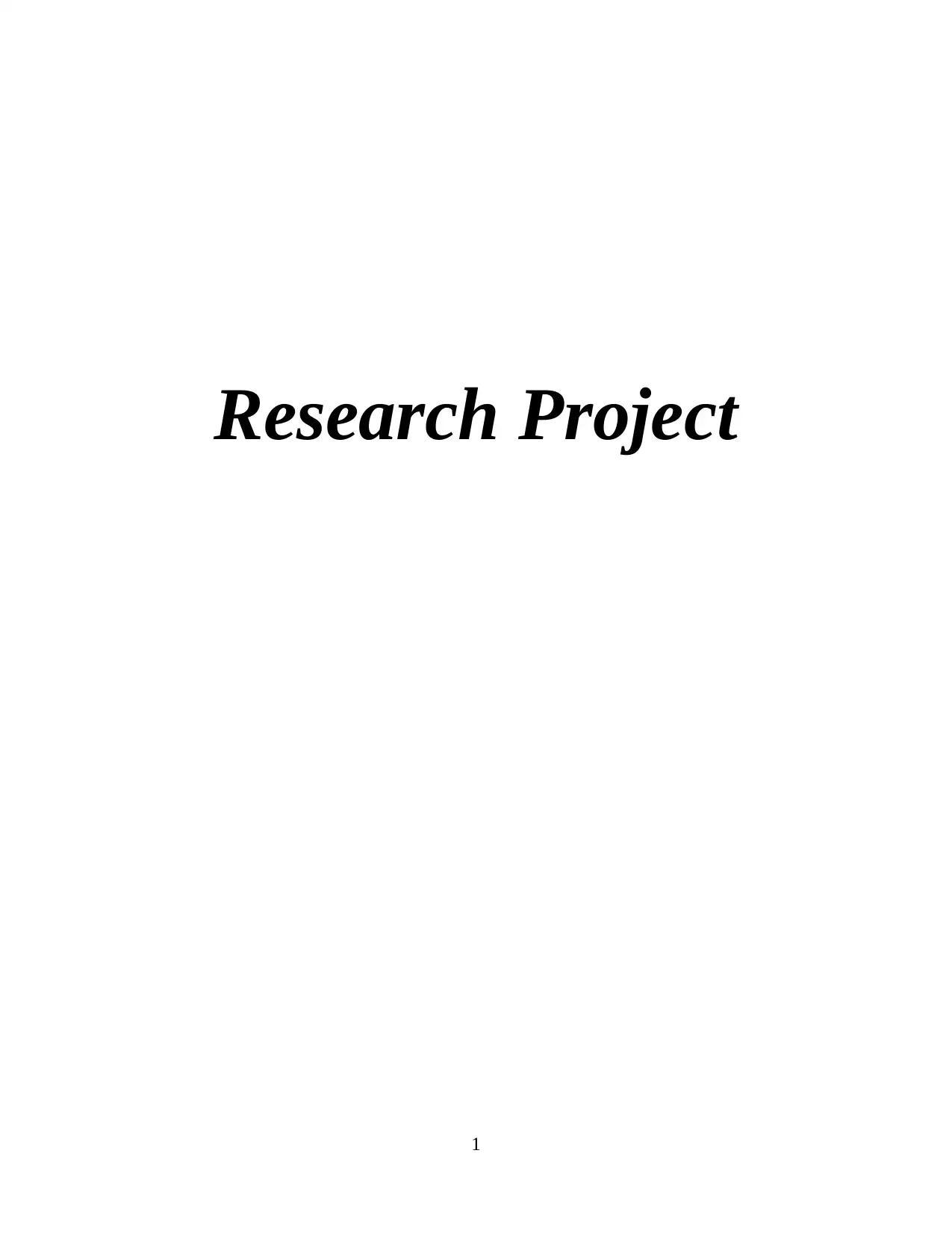
Research Project
1
1
Paraphrase This Document
Need a fresh take? Get an instant paraphrase of this document with our AI Paraphraser
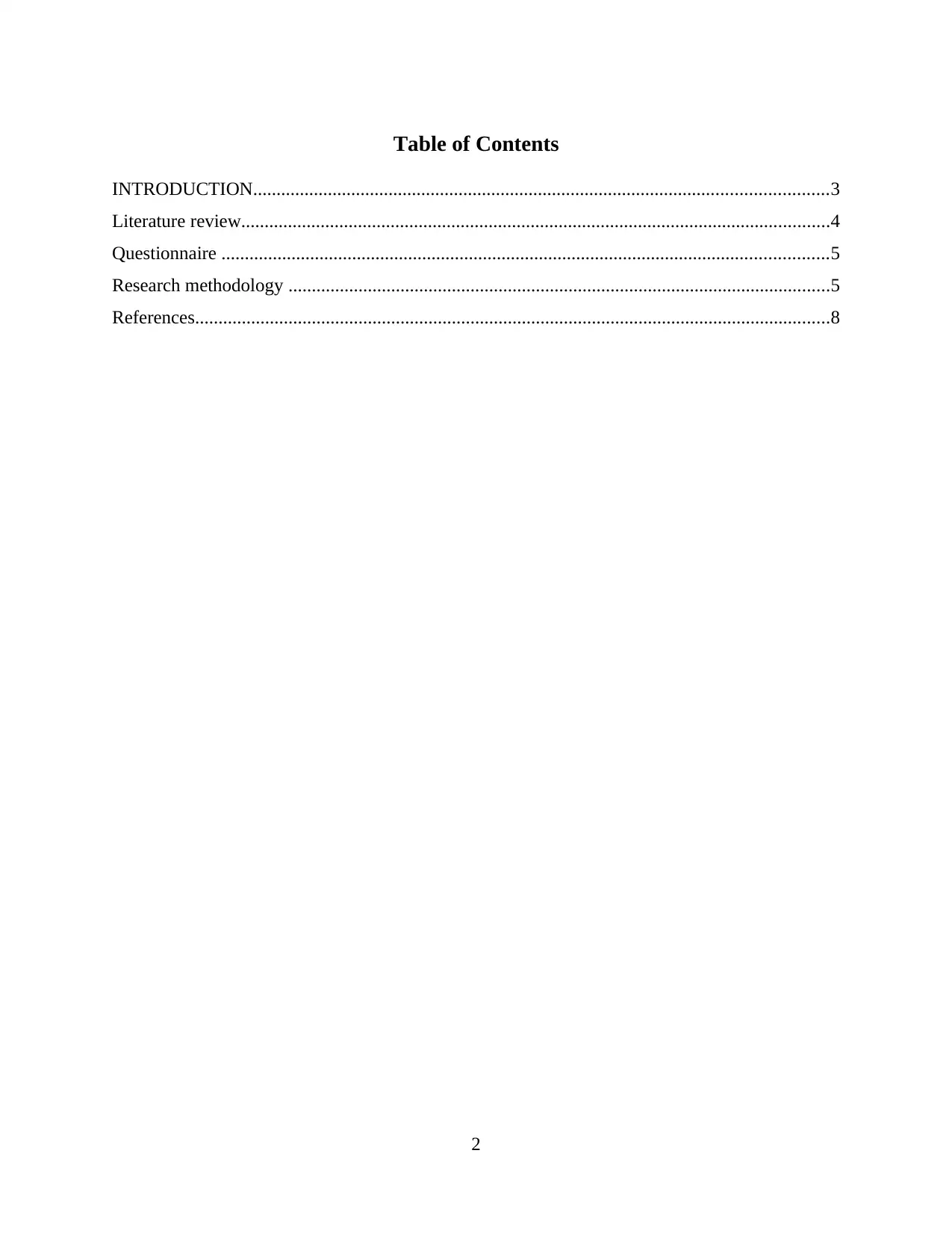
Table of Contents
INTRODUCTION...........................................................................................................................3
Literature review..............................................................................................................................4
Questionnaire ..................................................................................................................................5
Research methodology ....................................................................................................................5
References........................................................................................................................................8
2
INTRODUCTION...........................................................................................................................3
Literature review..............................................................................................................................4
Questionnaire ..................................................................................................................................5
Research methodology ....................................................................................................................5
References........................................................................................................................................8
2
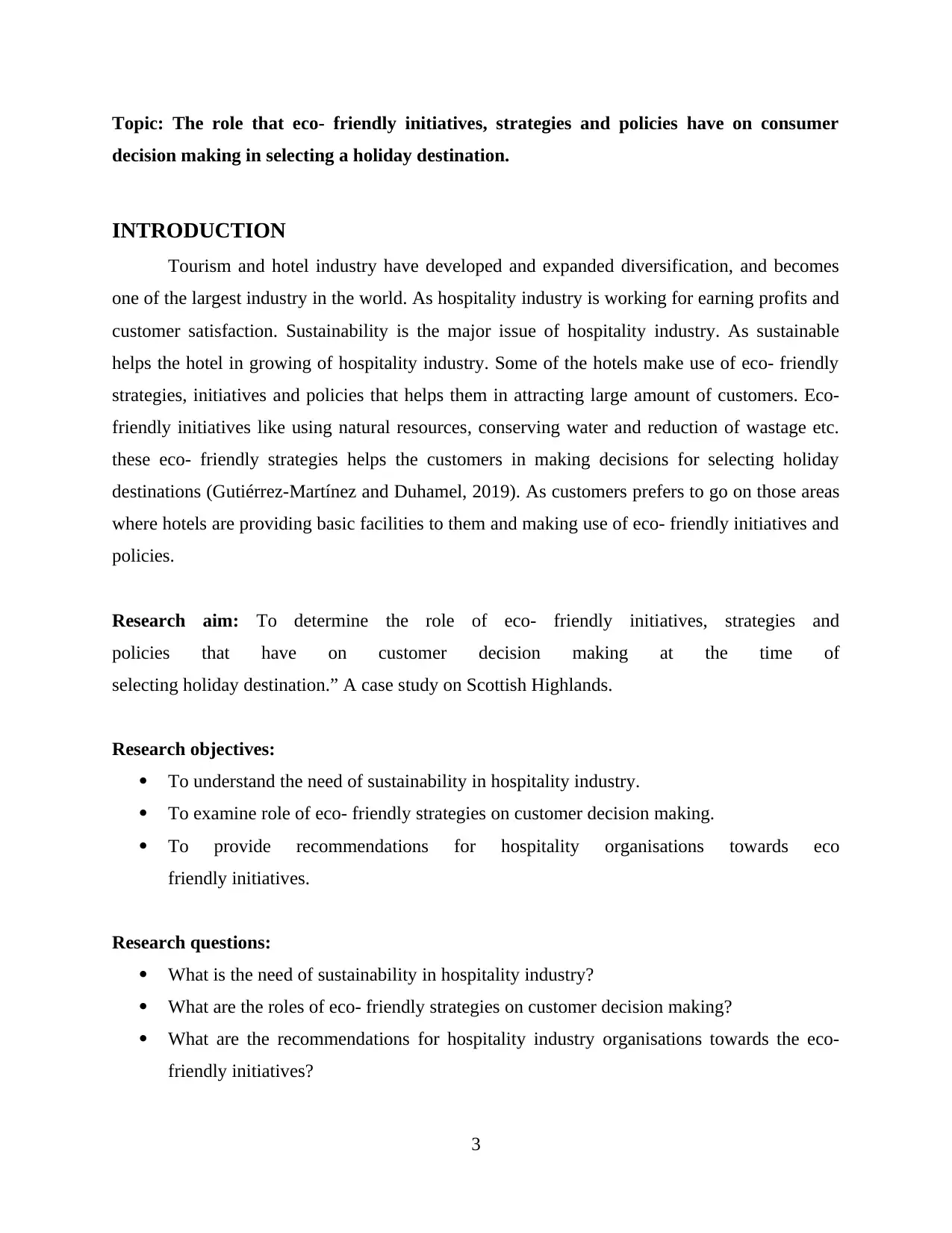
Topic: The role that eco- friendly initiatives, strategies and policies have on consumer
decision making in selecting a holiday destination.
INTRODUCTION
Tourism and hotel industry have developed and expanded diversification, and becomes
one of the largest industry in the world. As hospitality industry is working for earning profits and
customer satisfaction. Sustainability is the major issue of hospitality industry. As sustainable
helps the hotel in growing of hospitality industry. Some of the hotels make use of eco- friendly
strategies, initiatives and policies that helps them in attracting large amount of customers. Eco-
friendly initiatives like using natural resources, conserving water and reduction of wastage etc.
these eco- friendly strategies helps the customers in making decisions for selecting holiday
destinations (Gutiérrez-Martínez and Duhamel, 2019). As customers prefers to go on those areas
where hotels are providing basic facilities to them and making use of eco- friendly initiatives and
policies.
Research aim: To determine the role of eco- friendly initiatives, strategies and
policies that have on customer decision making at the time of
selecting holiday destination.” A case study on Scottish Highlands.
Research objectives:
To understand the need of sustainability in hospitality industry.
To examine role of eco- friendly strategies on customer decision making.
To provide recommendations for hospitality organisations towards eco
friendly initiatives.
Research questions:
What is the need of sustainability in hospitality industry?
What are the roles of eco- friendly strategies on customer decision making?
What are the recommendations for hospitality industry organisations towards the eco-
friendly initiatives?
3
decision making in selecting a holiday destination.
INTRODUCTION
Tourism and hotel industry have developed and expanded diversification, and becomes
one of the largest industry in the world. As hospitality industry is working for earning profits and
customer satisfaction. Sustainability is the major issue of hospitality industry. As sustainable
helps the hotel in growing of hospitality industry. Some of the hotels make use of eco- friendly
strategies, initiatives and policies that helps them in attracting large amount of customers. Eco-
friendly initiatives like using natural resources, conserving water and reduction of wastage etc.
these eco- friendly strategies helps the customers in making decisions for selecting holiday
destinations (Gutiérrez-Martínez and Duhamel, 2019). As customers prefers to go on those areas
where hotels are providing basic facilities to them and making use of eco- friendly initiatives and
policies.
Research aim: To determine the role of eco- friendly initiatives, strategies and
policies that have on customer decision making at the time of
selecting holiday destination.” A case study on Scottish Highlands.
Research objectives:
To understand the need of sustainability in hospitality industry.
To examine role of eco- friendly strategies on customer decision making.
To provide recommendations for hospitality organisations towards eco
friendly initiatives.
Research questions:
What is the need of sustainability in hospitality industry?
What are the roles of eco- friendly strategies on customer decision making?
What are the recommendations for hospitality industry organisations towards the eco-
friendly initiatives?
3
⊘ This is a preview!⊘
Do you want full access?
Subscribe today to unlock all pages.

Trusted by 1+ million students worldwide
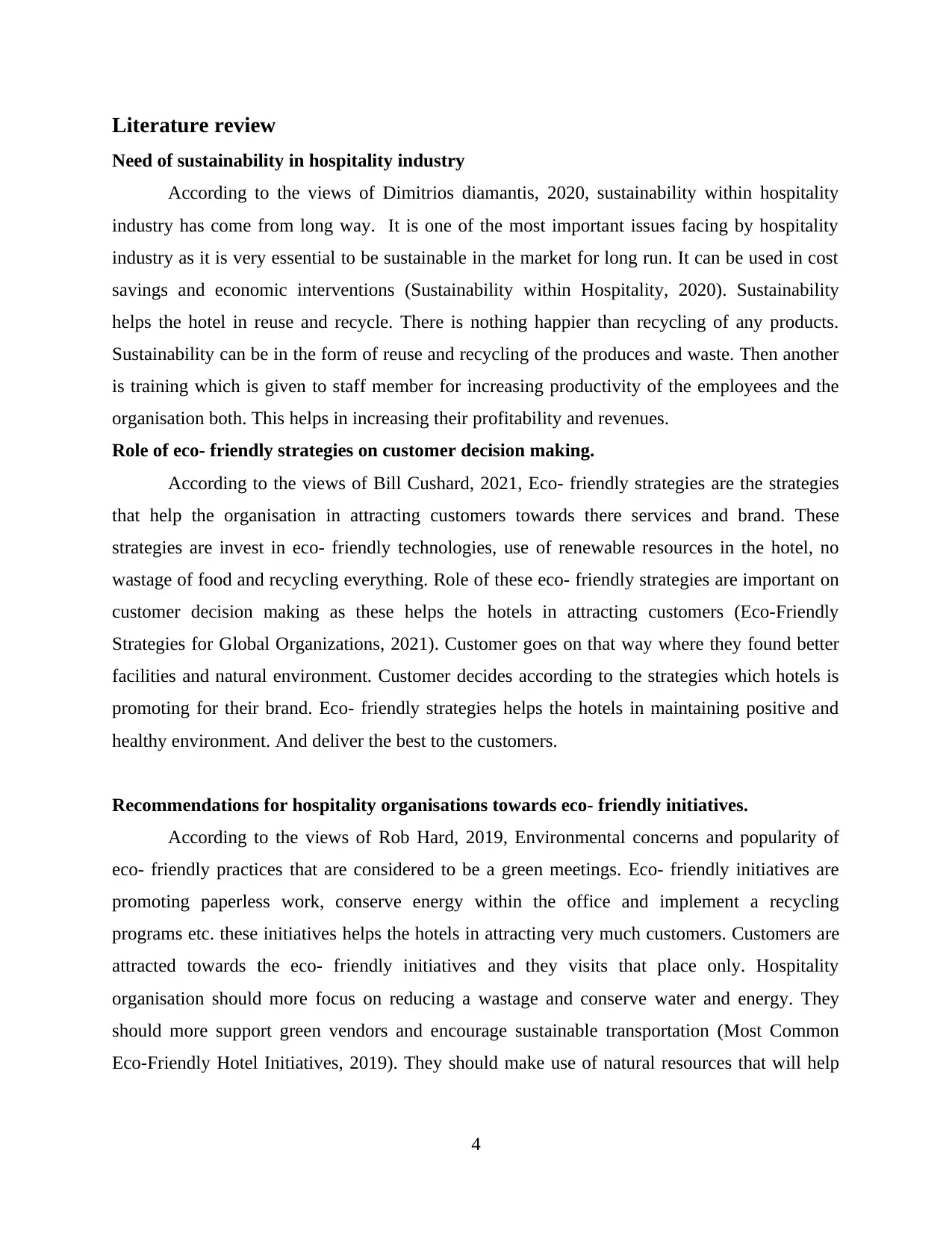
Literature review
Need of sustainability in hospitality industry
According to the views of Dimitrios diamantis, 2020, sustainability within hospitality
industry has come from long way. It is one of the most important issues facing by hospitality
industry as it is very essential to be sustainable in the market for long run. It can be used in cost
savings and economic interventions (Sustainability within Hospitality, 2020). Sustainability
helps the hotel in reuse and recycle. There is nothing happier than recycling of any products.
Sustainability can be in the form of reuse and recycling of the produces and waste. Then another
is training which is given to staff member for increasing productivity of the employees and the
organisation both. This helps in increasing their profitability and revenues.
Role of eco- friendly strategies on customer decision making.
According to the views of Bill Cushard, 2021, Eco- friendly strategies are the strategies
that help the organisation in attracting customers towards there services and brand. These
strategies are invest in eco- friendly technologies, use of renewable resources in the hotel, no
wastage of food and recycling everything. Role of these eco- friendly strategies are important on
customer decision making as these helps the hotels in attracting customers (Eco-Friendly
Strategies for Global Organizations, 2021). Customer goes on that way where they found better
facilities and natural environment. Customer decides according to the strategies which hotels is
promoting for their brand. Eco- friendly strategies helps the hotels in maintaining positive and
healthy environment. And deliver the best to the customers.
Recommendations for hospitality organisations towards eco- friendly initiatives.
According to the views of Rob Hard, 2019, Environmental concerns and popularity of
eco- friendly practices that are considered to be a green meetings. Eco- friendly initiatives are
promoting paperless work, conserve energy within the office and implement a recycling
programs etc. these initiatives helps the hotels in attracting very much customers. Customers are
attracted towards the eco- friendly initiatives and they visits that place only. Hospitality
organisation should more focus on reducing a wastage and conserve water and energy. They
should more support green vendors and encourage sustainable transportation (Most Common
Eco-Friendly Hotel Initiatives, 2019). They should make use of natural resources that will help
4
Need of sustainability in hospitality industry
According to the views of Dimitrios diamantis, 2020, sustainability within hospitality
industry has come from long way. It is one of the most important issues facing by hospitality
industry as it is very essential to be sustainable in the market for long run. It can be used in cost
savings and economic interventions (Sustainability within Hospitality, 2020). Sustainability
helps the hotel in reuse and recycle. There is nothing happier than recycling of any products.
Sustainability can be in the form of reuse and recycling of the produces and waste. Then another
is training which is given to staff member for increasing productivity of the employees and the
organisation both. This helps in increasing their profitability and revenues.
Role of eco- friendly strategies on customer decision making.
According to the views of Bill Cushard, 2021, Eco- friendly strategies are the strategies
that help the organisation in attracting customers towards there services and brand. These
strategies are invest in eco- friendly technologies, use of renewable resources in the hotel, no
wastage of food and recycling everything. Role of these eco- friendly strategies are important on
customer decision making as these helps the hotels in attracting customers (Eco-Friendly
Strategies for Global Organizations, 2021). Customer goes on that way where they found better
facilities and natural environment. Customer decides according to the strategies which hotels is
promoting for their brand. Eco- friendly strategies helps the hotels in maintaining positive and
healthy environment. And deliver the best to the customers.
Recommendations for hospitality organisations towards eco- friendly initiatives.
According to the views of Rob Hard, 2019, Environmental concerns and popularity of
eco- friendly practices that are considered to be a green meetings. Eco- friendly initiatives are
promoting paperless work, conserve energy within the office and implement a recycling
programs etc. these initiatives helps the hotels in attracting very much customers. Customers are
attracted towards the eco- friendly initiatives and they visits that place only. Hospitality
organisation should more focus on reducing a wastage and conserve water and energy. They
should more support green vendors and encourage sustainable transportation (Most Common
Eco-Friendly Hotel Initiatives, 2019). They should make use of natural resources that will help
4
Paraphrase This Document
Need a fresh take? Get an instant paraphrase of this document with our AI Paraphraser
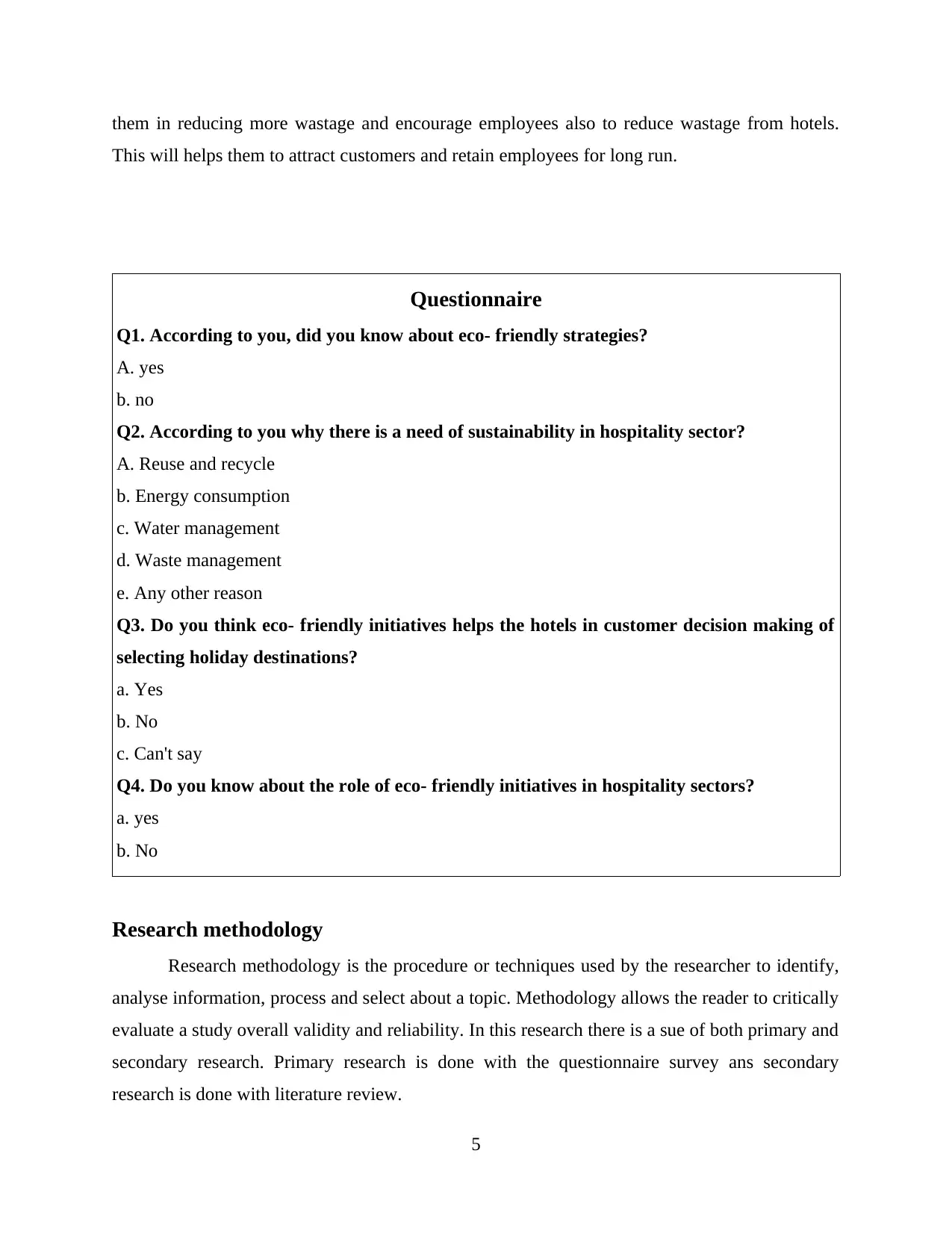
them in reducing more wastage and encourage employees also to reduce wastage from hotels.
This will helps them to attract customers and retain employees for long run.
Questionnaire
Q1. According to you, did you know about eco- friendly strategies?
A. yes
b. no
Q2. According to you why there is a need of sustainability in hospitality sector?
A. Reuse and recycle
b. Energy consumption
c. Water management
d. Waste management
e. Any other reason
Q3. Do you think eco- friendly initiatives helps the hotels in customer decision making of
selecting holiday destinations?
a. Yes
b. No
c. Can't say
Q4. Do you know about the role of eco- friendly initiatives in hospitality sectors?
a. yes
b. No
Research methodology
Research methodology is the procedure or techniques used by the researcher to identify,
analyse information, process and select about a topic. Methodology allows the reader to critically
evaluate a study overall validity and reliability. In this research there is a sue of both primary and
secondary research. Primary research is done with the questionnaire survey ans secondary
research is done with literature review.
5
This will helps them to attract customers and retain employees for long run.
Questionnaire
Q1. According to you, did you know about eco- friendly strategies?
A. yes
b. no
Q2. According to you why there is a need of sustainability in hospitality sector?
A. Reuse and recycle
b. Energy consumption
c. Water management
d. Waste management
e. Any other reason
Q3. Do you think eco- friendly initiatives helps the hotels in customer decision making of
selecting holiday destinations?
a. Yes
b. No
c. Can't say
Q4. Do you know about the role of eco- friendly initiatives in hospitality sectors?
a. yes
b. No
Research methodology
Research methodology is the procedure or techniques used by the researcher to identify,
analyse information, process and select about a topic. Methodology allows the reader to critically
evaluate a study overall validity and reliability. In this research there is a sue of both primary and
secondary research. Primary research is done with the questionnaire survey ans secondary
research is done with literature review.
5
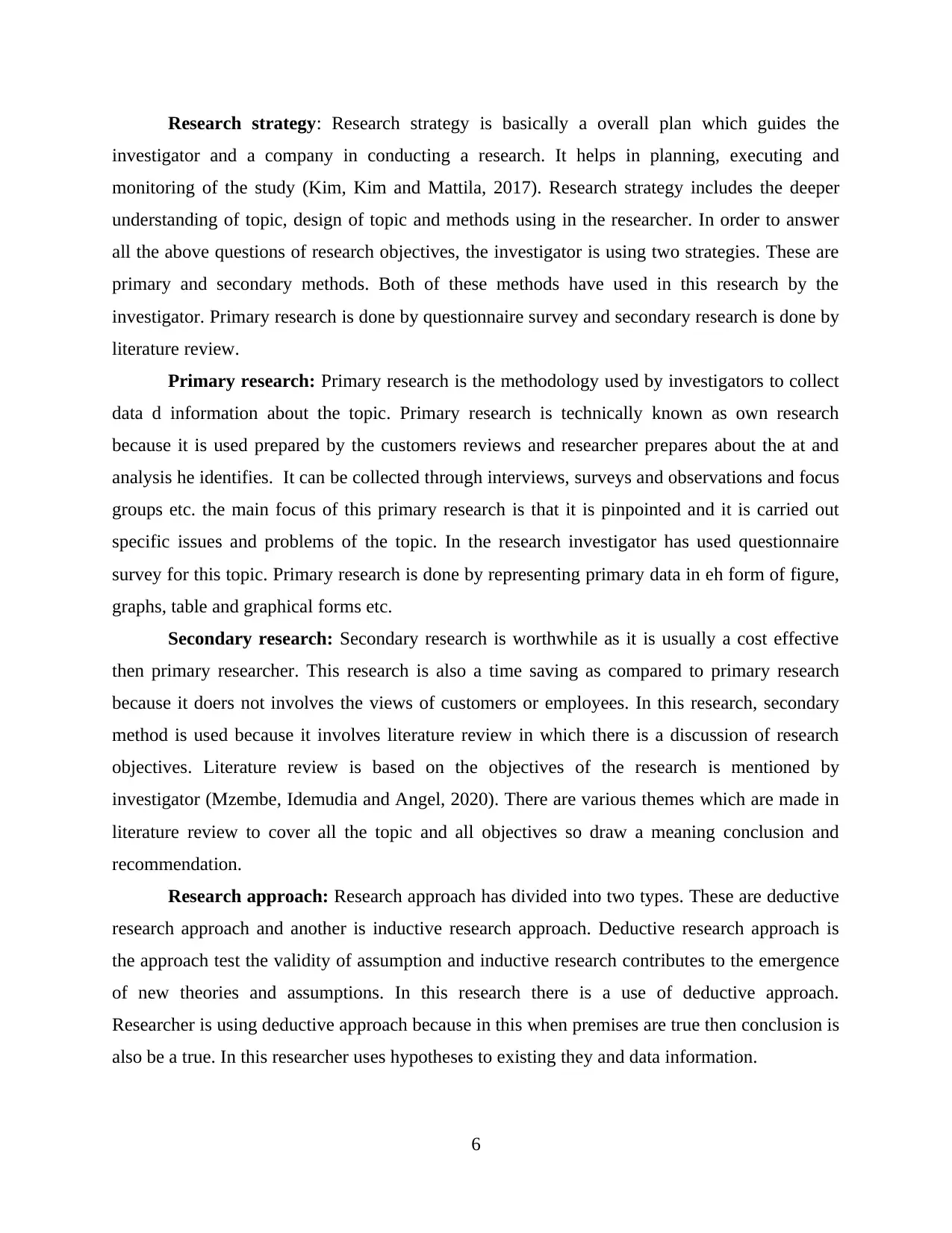
Research strategy: Research strategy is basically a overall plan which guides the
investigator and a company in conducting a research. It helps in planning, executing and
monitoring of the study (Kim, Kim and Mattila, 2017). Research strategy includes the deeper
understanding of topic, design of topic and methods using in the researcher. In order to answer
all the above questions of research objectives, the investigator is using two strategies. These are
primary and secondary methods. Both of these methods have used in this research by the
investigator. Primary research is done by questionnaire survey and secondary research is done by
literature review.
Primary research: Primary research is the methodology used by investigators to collect
data d information about the topic. Primary research is technically known as own research
because it is used prepared by the customers reviews and researcher prepares about the at and
analysis he identifies. It can be collected through interviews, surveys and observations and focus
groups etc. the main focus of this primary research is that it is pinpointed and it is carried out
specific issues and problems of the topic. In the research investigator has used questionnaire
survey for this topic. Primary research is done by representing primary data in eh form of figure,
graphs, table and graphical forms etc.
Secondary research: Secondary research is worthwhile as it is usually a cost effective
then primary researcher. This research is also a time saving as compared to primary research
because it doers not involves the views of customers or employees. In this research, secondary
method is used because it involves literature review in which there is a discussion of research
objectives. Literature review is based on the objectives of the research is mentioned by
investigator (Mzembe, Idemudia and Angel, 2020). There are various themes which are made in
literature review to cover all the topic and all objectives so draw a meaning conclusion and
recommendation.
Research approach: Research approach has divided into two types. These are deductive
research approach and another is inductive research approach. Deductive research approach is
the approach test the validity of assumption and inductive research contributes to the emergence
of new theories and assumptions. In this research there is a use of deductive approach.
Researcher is using deductive approach because in this when premises are true then conclusion is
also be a true. In this researcher uses hypotheses to existing they and data information.
6
investigator and a company in conducting a research. It helps in planning, executing and
monitoring of the study (Kim, Kim and Mattila, 2017). Research strategy includes the deeper
understanding of topic, design of topic and methods using in the researcher. In order to answer
all the above questions of research objectives, the investigator is using two strategies. These are
primary and secondary methods. Both of these methods have used in this research by the
investigator. Primary research is done by questionnaire survey and secondary research is done by
literature review.
Primary research: Primary research is the methodology used by investigators to collect
data d information about the topic. Primary research is technically known as own research
because it is used prepared by the customers reviews and researcher prepares about the at and
analysis he identifies. It can be collected through interviews, surveys and observations and focus
groups etc. the main focus of this primary research is that it is pinpointed and it is carried out
specific issues and problems of the topic. In the research investigator has used questionnaire
survey for this topic. Primary research is done by representing primary data in eh form of figure,
graphs, table and graphical forms etc.
Secondary research: Secondary research is worthwhile as it is usually a cost effective
then primary researcher. This research is also a time saving as compared to primary research
because it doers not involves the views of customers or employees. In this research, secondary
method is used because it involves literature review in which there is a discussion of research
objectives. Literature review is based on the objectives of the research is mentioned by
investigator (Mzembe, Idemudia and Angel, 2020). There are various themes which are made in
literature review to cover all the topic and all objectives so draw a meaning conclusion and
recommendation.
Research approach: Research approach has divided into two types. These are deductive
research approach and another is inductive research approach. Deductive research approach is
the approach test the validity of assumption and inductive research contributes to the emergence
of new theories and assumptions. In this research there is a use of deductive approach.
Researcher is using deductive approach because in this when premises are true then conclusion is
also be a true. In this researcher uses hypotheses to existing they and data information.
6
⊘ This is a preview!⊘
Do you want full access?
Subscribe today to unlock all pages.

Trusted by 1+ million students worldwide
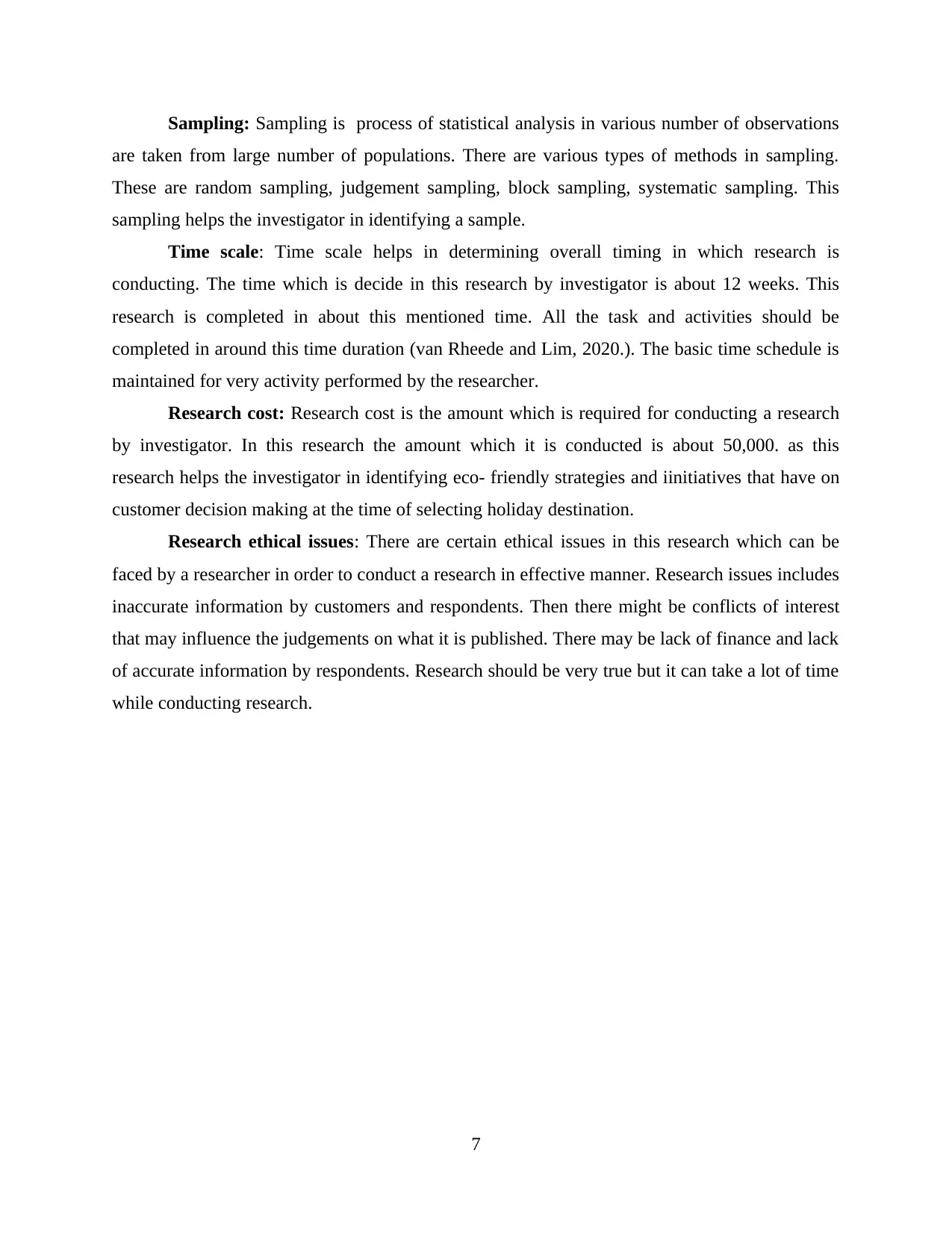
Sampling: Sampling is process of statistical analysis in various number of observations
are taken from large number of populations. There are various types of methods in sampling.
These are random sampling, judgement sampling, block sampling, systematic sampling. This
sampling helps the investigator in identifying a sample.
Time scale: Time scale helps in determining overall timing in which research is
conducting. The time which is decide in this research by investigator is about 12 weeks. This
research is completed in about this mentioned time. All the task and activities should be
completed in around this time duration (van Rheede and Lim, 2020.). The basic time schedule is
maintained for very activity performed by the researcher.
Research cost: Research cost is the amount which is required for conducting a research
by investigator. In this research the amount which it is conducted is about 50,000. as this
research helps the investigator in identifying eco- friendly strategies and iinitiatives that have on
customer decision making at the time of selecting holiday destination.
Research ethical issues: There are certain ethical issues in this research which can be
faced by a researcher in order to conduct a research in effective manner. Research issues includes
inaccurate information by customers and respondents. Then there might be conflicts of interest
that may influence the judgements on what it is published. There may be lack of finance and lack
of accurate information by respondents. Research should be very true but it can take a lot of time
while conducting research.
7
are taken from large number of populations. There are various types of methods in sampling.
These are random sampling, judgement sampling, block sampling, systematic sampling. This
sampling helps the investigator in identifying a sample.
Time scale: Time scale helps in determining overall timing in which research is
conducting. The time which is decide in this research by investigator is about 12 weeks. This
research is completed in about this mentioned time. All the task and activities should be
completed in around this time duration (van Rheede and Lim, 2020.). The basic time schedule is
maintained for very activity performed by the researcher.
Research cost: Research cost is the amount which is required for conducting a research
by investigator. In this research the amount which it is conducted is about 50,000. as this
research helps the investigator in identifying eco- friendly strategies and iinitiatives that have on
customer decision making at the time of selecting holiday destination.
Research ethical issues: There are certain ethical issues in this research which can be
faced by a researcher in order to conduct a research in effective manner. Research issues includes
inaccurate information by customers and respondents. Then there might be conflicts of interest
that may influence the judgements on what it is published. There may be lack of finance and lack
of accurate information by respondents. Research should be very true but it can take a lot of time
while conducting research.
7
Paraphrase This Document
Need a fresh take? Get an instant paraphrase of this document with our AI Paraphraser
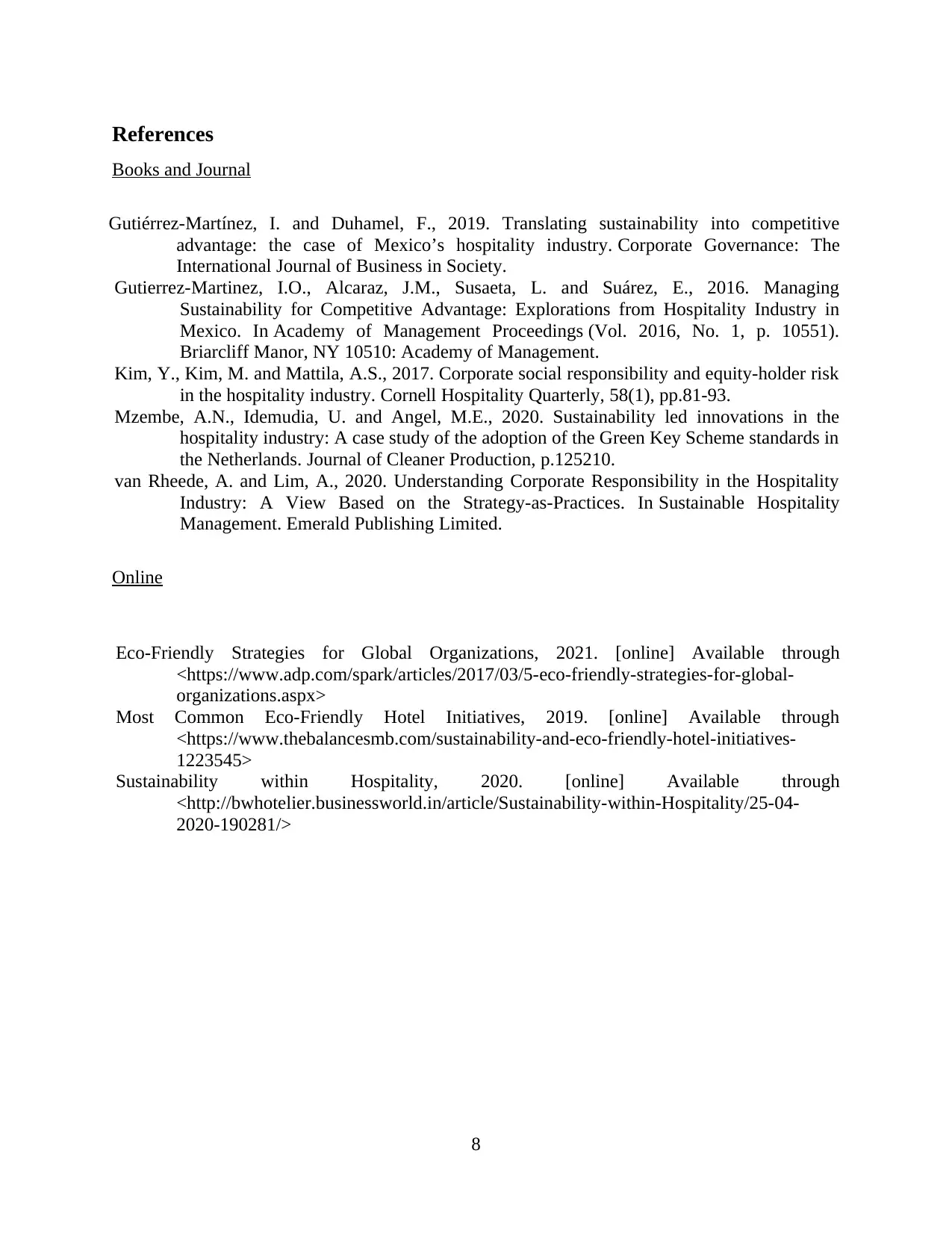
References
Books and Journal
Gutiérrez-Martínez, I. and Duhamel, F., 2019. Translating sustainability into competitive
advantage: the case of Mexico’s hospitality industry. Corporate Governance: The
International Journal of Business in Society.
Gutierrez-Martinez, I.O., Alcaraz, J.M., Susaeta, L. and Suárez, E., 2016. Managing
Sustainability for Competitive Advantage: Explorations from Hospitality Industry in
Mexico. In Academy of Management Proceedings (Vol. 2016, No. 1, p. 10551).
Briarcliff Manor, NY 10510: Academy of Management.
Kim, Y., Kim, M. and Mattila, A.S., 2017. Corporate social responsibility and equity-holder risk
in the hospitality industry. Cornell Hospitality Quarterly, 58(1), pp.81-93.
Mzembe, A.N., Idemudia, U. and Angel, M.E., 2020. Sustainability led innovations in the
hospitality industry: A case study of the adoption of the Green Key Scheme standards in
the Netherlands. Journal of Cleaner Production, p.125210.
van Rheede, A. and Lim, A., 2020. Understanding Corporate Responsibility in the Hospitality
Industry: A View Based on the Strategy-as-Practices. In Sustainable Hospitality
Management. Emerald Publishing Limited.
Online
Eco-Friendly Strategies for Global Organizations, 2021. [online] Available through
<https://www.adp.com/spark/articles/2017/03/5-eco-friendly-strategies-for-global-
organizations.aspx>
Most Common Eco-Friendly Hotel Initiatives, 2019. [online] Available through
<https://www.thebalancesmb.com/sustainability-and-eco-friendly-hotel-initiatives-
1223545>
Sustainability within Hospitality, 2020. [online] Available through
<http://bwhotelier.businessworld.in/article/Sustainability-within-Hospitality/25-04-
2020-190281/>
8
Books and Journal
Gutiérrez-Martínez, I. and Duhamel, F., 2019. Translating sustainability into competitive
advantage: the case of Mexico’s hospitality industry. Corporate Governance: The
International Journal of Business in Society.
Gutierrez-Martinez, I.O., Alcaraz, J.M., Susaeta, L. and Suárez, E., 2016. Managing
Sustainability for Competitive Advantage: Explorations from Hospitality Industry in
Mexico. In Academy of Management Proceedings (Vol. 2016, No. 1, p. 10551).
Briarcliff Manor, NY 10510: Academy of Management.
Kim, Y., Kim, M. and Mattila, A.S., 2017. Corporate social responsibility and equity-holder risk
in the hospitality industry. Cornell Hospitality Quarterly, 58(1), pp.81-93.
Mzembe, A.N., Idemudia, U. and Angel, M.E., 2020. Sustainability led innovations in the
hospitality industry: A case study of the adoption of the Green Key Scheme standards in
the Netherlands. Journal of Cleaner Production, p.125210.
van Rheede, A. and Lim, A., 2020. Understanding Corporate Responsibility in the Hospitality
Industry: A View Based on the Strategy-as-Practices. In Sustainable Hospitality
Management. Emerald Publishing Limited.
Online
Eco-Friendly Strategies for Global Organizations, 2021. [online] Available through
<https://www.adp.com/spark/articles/2017/03/5-eco-friendly-strategies-for-global-
organizations.aspx>
Most Common Eco-Friendly Hotel Initiatives, 2019. [online] Available through
<https://www.thebalancesmb.com/sustainability-and-eco-friendly-hotel-initiatives-
1223545>
Sustainability within Hospitality, 2020. [online] Available through
<http://bwhotelier.businessworld.in/article/Sustainability-within-Hospitality/25-04-
2020-190281/>
8
1 out of 8
Related Documents
Your All-in-One AI-Powered Toolkit for Academic Success.
+13062052269
info@desklib.com
Available 24*7 on WhatsApp / Email
![[object Object]](/_next/static/media/star-bottom.7253800d.svg)
Unlock your academic potential
Copyright © 2020–2026 A2Z Services. All Rights Reserved. Developed and managed by ZUCOL.





